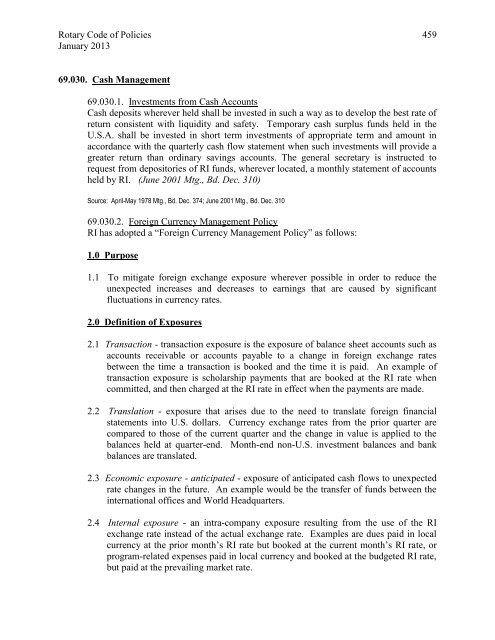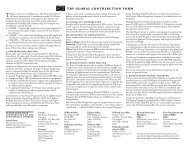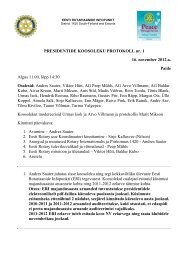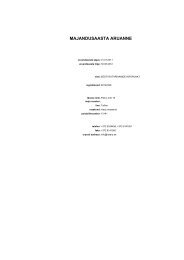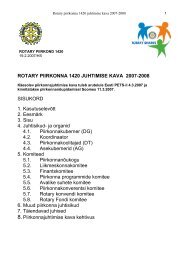- Page 1:
ROTARY CODE OF POLICIES January 201
- Page 5 and 6:
Preface Rotary Code of Policies Pag
- Page 7 and 8:
Preface Rotary Code of Policies Pag
- Page 9 and 10:
Codification Outline Rotary Code of
- Page 11 and 12:
Codification Outline Rotary Code of
- Page 13 and 14:
Codification Outline Rotary Code of
- Page 15 and 16:
Codification Outline Rotary Code of
- Page 17 and 18:
Codification Outline Rotary Code of
- Page 19 and 20:
Rotary Code of Policies 1 January 2
- Page 21 and 22:
Rotary Code of Policies 3 January 2
- Page 23 and 24:
Rotary Code of Policies 5 January 2
- Page 25 and 26:
Rotary Code of Policies 7 January 2
- Page 27 and 28:
Rotary Code of Policies 9 January 2
- Page 29 and 30:
Rotary Code of Policies 11 January
- Page 31 and 32:
Rotary Code of Policies 13 January
- Page 33 and 34:
Rotary Code of Policies 15 January
- Page 35 and 36:
Rotary Code of Policies 17 January
- Page 37 and 38:
Rotary Code of Policies 19 January
- Page 39 and 40:
Rotary Code of Policies 21 January
- Page 41 and 42:
Rotary Code of Policies 23 January
- Page 43 and 44:
Rotary Code of Policies 25 January
- Page 45 and 46:
Rotary Code of Policies 27 January
- Page 47 and 48:
Rotary Code of Policies 29 January
- Page 49 and 50:
Rotary Code of Policies 31 January
- Page 51 and 52:
Rotary Code of Policies 33 January
- Page 53 and 54:
Rotary Code of Policies 35 January
- Page 55 and 56:
Rotary Code of Policies 37 January
- Page 57 and 58:
Rotary Code of Policies 39 January
- Page 59 and 60:
Rotary Code of Policies 41 January
- Page 61 and 62:
Rotary Code of Policies 43 January
- Page 63 and 64:
Rotary Code of Policies 45 January
- Page 65 and 66:
Rotary Code of Policies 47 January
- Page 67 and 68:
Rotary Code of Policies 49 January
- Page 69 and 70:
Rotary Code of Policies 51 January
- Page 71 and 72:
Rotary Code of Policies 53 January
- Page 73 and 74:
Rotary Code of Policies 55 January
- Page 75 and 76:
Rotary Code of Policies 57 January
- Page 77 and 78:
Rotary Code of Policies 59 January
- Page 79 and 80:
Rotary Code of Policies 61 January
- Page 81 and 82:
Rotary Code of Policies 63 January
- Page 83 and 84:
Rotary Code of Policies 65 January
- Page 85 and 86:
Rotary Code of Policies 67 January
- Page 87 and 88:
Rotary Code of Policies 69 January
- Page 89 and 90:
Rotary Code of Policies 71 January
- Page 91 and 92:
Rotary Code of Policies 73 January
- Page 93 and 94:
Rotary Code of Policies 75 January
- Page 95 and 96:
Rotary Code of Policies 77 January
- Page 97 and 98:
Rotary Code of Policies 79 January
- Page 99 and 100:
Rotary Code of Policies 81 January
- Page 101 and 102:
Rotary Code of Policies 83 January
- Page 103 and 104:
Rotary Code of Policies 85 January
- Page 105 and 106:
Rotary Code of Policies 87 January
- Page 107 and 108:
Rotary Code of Policies 89 January
- Page 109 and 110:
Rotary Code of Policies 91 January
- Page 111 and 112:
Rotary Code of Policies 93 January
- Page 113 and 114:
Rotary Code of Policies 95 January
- Page 115 and 116:
Rotary Code of Policies 97 January
- Page 117 and 118:
Rotary Code of Policies 99 January
- Page 119 and 120:
Rotary Code of Policies 101 January
- Page 121 and 122:
Rotary Code of Policies 103 January
- Page 123 and 124:
Rotary Code of Policies 105 January
- Page 125 and 126:
Rotary Code of Policies 107 January
- Page 127 and 128:
Rotary Code of Policies 109 January
- Page 129 and 130:
Rotary Code of Policies 111 January
- Page 131 and 132:
Rotary Code of Policies 113 January
- Page 133 and 134:
Rotary Code of Policies 115 January
- Page 135 and 136:
Rotary Code of Policies 117 January
- Page 137 and 138:
Rotary Code of Policies 119 January
- Page 139 and 140:
Rotary Code of Policies 121 January
- Page 141 and 142:
Rotary Code of Policies 123 January
- Page 143 and 144:
Rotary Code of Policies 125 January
- Page 145 and 146:
Rotary Code of Policies 127 January
- Page 147 and 148:
Rotary Code of Policies 129 January
- Page 149 and 150:
Rotary Code of Policies 131 January
- Page 151 and 152:
Rotary Code of Policies 133 January
- Page 153 and 154:
Rotary Code of Policies 135 January
- Page 155 and 156:
Rotary Code of Policies 137 January
- Page 157 and 158:
Rotary Code of Policies 139 January
- Page 159 and 160:
Rotary Code of Policies 141 January
- Page 161 and 162:
Rotary Code of Policies 143 January
- Page 163 and 164:
Rotary Code of Policies 145 January
- Page 165 and 166:
Rotary Code of Policies 147 January
- Page 167 and 168:
Rotary Code of Policies 149 January
- Page 169 and 170:
Rotary Code of Policies 151 January
- Page 171 and 172:
Rotary Code of Policies 153 January
- Page 173 and 174:
Rotary Code of Policies 155 January
- Page 175 and 176:
Rotary Code of Policies 157 January
- Page 177 and 178:
Rotary Code of Policies 159 January
- Page 179 and 180:
Rotary Code of Policies 161 January
- Page 181 and 182:
Rotary Code of Policies 163 January
- Page 183 and 184:
Rotary Code of Policies 165 January
- Page 185 and 186:
Rotary Code of Policies 167 January
- Page 187 and 188:
Rotary Code of Policies 169 January
- Page 189 and 190:
Rotary Code of Policies 171 January
- Page 191 and 192:
Rotary Code of Policies 173 January
- Page 193 and 194:
Rotary Code of Policies 175 January
- Page 195 and 196:
Rotary Code of Policies 177 January
- Page 197 and 198:
Rotary Code of Policies 179 January
- Page 199 and 200:
Rotary Code of Policies 181 January
- Page 201 and 202:
Rotary Code of Policies 183 January
- Page 203 and 204:
Rotary Code of Policies 185 January
- Page 205 and 206:
Rotary Code of Policies 187 January
- Page 207 and 208:
Rotary Code of Policies 189 January
- Page 209 and 210:
Rotary Code of Policies 191 January
- Page 211 and 212:
Rotary Code of Policies 193 January
- Page 213 and 214:
Rotary Code of Policies 195 January
- Page 215 and 216:
Rotary Code of Policies 197 January
- Page 217 and 218:
Rotary Code of Policies 199 January
- Page 219 and 220:
Rotary Code of Policies 201 January
- Page 221 and 222:
Rotary Code of Policies 203 January
- Page 223 and 224:
Rotary Code of Policies 205 January
- Page 225 and 226:
Rotary Code of Policies 207 January
- Page 227 and 228:
Rotary Code of Policies 209 January
- Page 229 and 230:
Rotary Code of Policies 211 January
- Page 231 and 232:
Rotary Code of Policies 213 January
- Page 233 and 234:
Rotary Code of Policies 215 January
- Page 235 and 236:
Rotary Code of Policies 217 January
- Page 237 and 238:
Rotary Code of Policies 219 January
- Page 239 and 240:
Rotary Code of Policies 221 January
- Page 241 and 242:
Rotary Code of Policies 223 January
- Page 243 and 244:
Rotary Code of Policies 225 January
- Page 245 and 246:
Rotary Code of Policies 227 January
- Page 247 and 248:
Rotary Code of Policies 229 January
- Page 249 and 250:
Rotary Code of Policies 231 January
- Page 251 and 252:
Rotary Code of Policies 233 January
- Page 253 and 254:
Rotary Code of Policies 235 January
- Page 255 and 256:
Rotary Code of Policies 237 January
- Page 257 and 258:
Rotary Code of Policies 239 January
- Page 259 and 260:
Rotary Code of Policies 241 January
- Page 261 and 262:
Rotary Code of Policies 243 January
- Page 263 and 264:
Rotary Code of Policies 245 January
- Page 265 and 266:
Rotary Code of Policies 247 January
- Page 267 and 268:
Rotary Code of Policies 249 January
- Page 269 and 270:
Rotary Code of Policies 251 January
- Page 271 and 272:
Rotary Code of Policies 253 January
- Page 273 and 274:
Rotary Code of Policies 255 January
- Page 275 and 276:
Rotary Code of Policies 257 January
- Page 277 and 278:
Rotary Code of Policies 259 January
- Page 279 and 280:
Rotary Code of Policies 261 January
- Page 281 and 282:
Rotary Code of Policies 263 January
- Page 283 and 284:
Rotary Code of Policies 265 January
- Page 285 and 286:
Rotary Code of Policies 267 January
- Page 287 and 288:
Rotary Code of Policies 269 January
- Page 289 and 290:
Rotary Code of Policies 271 January
- Page 291 and 292:
Rotary Code of Policies 273 January
- Page 293 and 294:
Rotary Code of Policies 275 January
- Page 295 and 296:
Rotary Code of Policies 277 January
- Page 297 and 298:
Rotary Code of Policies 279 January
- Page 299 and 300:
Rotary Code of Policies 281 January
- Page 301 and 302:
Rotary Code of Policies 283 January
- Page 303 and 304:
Rotary Code of Policies 285 January
- Page 305 and 306:
Rotary Code of Policies 287 January
- Page 307 and 308:
Rotary Code of Policies 289 January
- Page 309 and 310:
Rotary Code of Policies 291 January
- Page 311 and 312:
Rotary Code of Policies 293 January
- Page 313 and 314:
Rotary Code of Policies 295 January
- Page 315 and 316:
Rotary Code of Policies 297 January
- Page 317 and 318:
Rotary Code of Policies 299 January
- Page 319 and 320:
Rotary Code of Policies 301 January
- Page 321 and 322:
Rotary Code of Policies 303 January
- Page 323 and 324:
Rotary Code of Policies 305 January
- Page 325 and 326:
Rotary Code of Policies 307 January
- Page 327 and 328:
Rotary Code of Policies 309 January
- Page 329 and 330:
Rotary Code of Policies 311 January
- Page 331 and 332:
Rotary Code of Policies 313 January
- Page 333 and 334:
Rotary Code of Policies 315 January
- Page 335 and 336:
Rotary Code of Policies 317 January
- Page 337 and 338:
Rotary Code of Policies 319 January
- Page 339 and 340:
Rotary Code of Policies 321 January
- Page 341 and 342:
Rotary Code of Policies 323 January
- Page 343 and 344:
Rotary Code of Policies 325 January
- Page 345 and 346:
Rotary Code of Policies 327 January
- Page 347 and 348:
Rotary Code of Policies 329 January
- Page 349 and 350:
Rotary Code of Policies 331 January
- Page 351 and 352:
Rotary Code of Policies 333 January
- Page 353 and 354:
Rotary Code of Policies 335 January
- Page 355 and 356:
Rotary Code of Policies 337 January
- Page 357 and 358:
Rotary Code of Policies 339 January
- Page 359 and 360:
Rotary Code of Policies 341 January
- Page 361 and 362:
Rotary Code of Policies 343 January
- Page 363 and 364:
Rotary Code of Policies 345 January
- Page 365 and 366:
Rotary Code of Policies 347 January
- Page 367 and 368:
Rotary Code of Policies 349 January
- Page 369 and 370:
Rotary Code of Policies 351 January
- Page 371 and 372:
Rotary Code of Policies 353 January
- Page 373 and 374:
Rotary Code of Policies 355 January
- Page 375 and 376:
Rotary Code of Policies 357 January
- Page 377 and 378:
Rotary Code of Policies 359 January
- Page 379 and 380:
Rotary Code of Policies 361 January
- Page 381 and 382:
Rotary Code of Policies 363 January
- Page 383 and 384:
Rotary Code of Policies 365 January
- Page 385 and 386:
Rotary Code of Policies 367 January
- Page 387 and 388:
Rotary Code of Policies 369 January
- Page 389 and 390:
Rotary Code of Policies 371 January
- Page 391 and 392:
Rotary Code of Policies 373 January
- Page 393 and 394:
Rotary Code of Policies 375 January
- Page 395 and 396:
Rotary Code of Policies 377 January
- Page 397 and 398:
Rotary Code of Policies 379 January
- Page 399 and 400:
Rotary Code of Policies 381 January
- Page 401 and 402:
Rotary Code of Policies 383 January
- Page 403 and 404:
Rotary Code of Policies 385 January
- Page 405 and 406:
Rotary Code of Policies 387 January
- Page 407 and 408:
Rotary Code of Policies 389 January
- Page 409 and 410:
Rotary Code of Policies 391 January
- Page 411 and 412:
Rotary Code of Policies 393 January
- Page 413 and 414:
Rotary Code of Policies 395 January
- Page 415 and 416:
Rotary Code of Policies 397 January
- Page 417 and 418:
Rotary Code of Policies 399 January
- Page 419 and 420:
Rotary Code of Policies 401 January
- Page 421 and 422:
Rotary Code of Policies 403 January
- Page 423 and 424:
Rotary Code of Policies 405 January
- Page 425 and 426: Rotary Code of Policies 407 January
- Page 427 and 428: Rotary Code of Policies 409 January
- Page 429 and 430: Rotary Code of Policies 411 January
- Page 431 and 432: Rotary Code of Policies 413 January
- Page 433 and 434: Rotary Code of Policies 415 January
- Page 435 and 436: Rotary Code of Policies 417 January
- Page 437 and 438: Rotary Code of Policies 419 January
- Page 439 and 440: Rotary Code of Policies 421 January
- Page 441 and 442: Rotary Code of Policies 423 January
- Page 443 and 444: Rotary Code of Policies 425 January
- Page 445 and 446: Rotary Code of Policies 427 January
- Page 447 and 448: Rotary Code of Policies 429 January
- Page 449 and 450: Rotary Code of Policies 431 January
- Page 451 and 452: Rotary Code of Policies 433 January
- Page 453 and 454: Rotary Code of Policies 435 January
- Page 455 and 456: Rotary Code of Policies 437 January
- Page 457 and 458: Rotary Code of Policies 439 January
- Page 459 and 460: Rotary Code of Policies 441 January
- Page 461 and 462: Rotary Code of Policies 443 January
- Page 463 and 464: Rotary Code of Policies 445 January
- Page 465 and 466: Rotary Code of Policies 447 January
- Page 467 and 468: Rotary Code of Policies 449 January
- Page 469 and 470: Rotary Code of Policies 451 January
- Page 471 and 472: Rotary Code of Policies 453 January
- Page 473 and 474: Rotary Code of Policies 455 January
- Page 475: Rotary Code of Policies 457 January
- Page 479 and 480: Rotary Code of Policies 461 January
- Page 481 and 482: Rotary Code of Policies 463 January
- Page 483 and 484: Rotary Code of Policies 465 January
- Page 485 and 486: Rotary Code of Policies 467 January
- Page 487 and 488: Rotary Code of Policies 469 January
- Page 489 and 490: Rotary Code of Policies 471 January
- Page 491 and 492: Rotary Code of Policies 473 January
- Page 493 and 494: Rotary Code of Policies January 201
- Page 495 and 496: Rotary Code of Policies January 201
- Page 497 and 498: Rotary Code of Policies January 201
- Page 499 and 500: Rotary Code of Policies January 201
- Page 501 and 502: Rotary Code of Policies January 201
- Page 503 and 504: Rotary Code of Policies January 201
- Page 505 and 506: Rotary Code of Policies January 201


